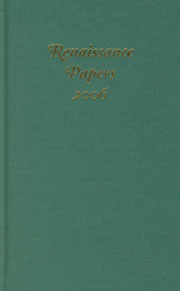Book contents
- Frontmatter
- Contents
- Renaissance Papers
- Youthes Witte: An Unstudied Elizabethan Anthology of Printed Verse and Prose Fiction
- The Power of Association: A Study in the Legitimization of Bianca Cappello through Medici Matriarchal Portraiture
- Vindicta and Vindiciae on the Early English Stage: Imagining Revenge through Huguenot Resistance Theory
- Breaking the Head of the Serpent: Women's Childbirth Prayers in The Monument of Matrones
- “Conquered nations mean nothing in love”: Political Dissent in Propertius's Elegy II.7 and Donne's “Love's Warre”
- Correcting Double Vision in The Comedy of Errors
- Lear's Awakening: Texts and Contexts
- The Power of Fantasy in Middleton's Chaste Maid: A Cost/Benefit Analysis
- Invariant Paratexts in English Dramatic Texts
- Milton and Forgiveness
- Samson at the Fair
- The End of Samson Agonistes
The Power of Fantasy in Middleton's Chaste Maid: A Cost/Benefit Analysis
Published online by Cambridge University Press: 12 September 2012
- Frontmatter
- Contents
- Renaissance Papers
- Youthes Witte: An Unstudied Elizabethan Anthology of Printed Verse and Prose Fiction
- The Power of Association: A Study in the Legitimization of Bianca Cappello through Medici Matriarchal Portraiture
- Vindicta and Vindiciae on the Early English Stage: Imagining Revenge through Huguenot Resistance Theory
- Breaking the Head of the Serpent: Women's Childbirth Prayers in The Monument of Matrones
- “Conquered nations mean nothing in love”: Political Dissent in Propertius's Elegy II.7 and Donne's “Love's Warre”
- Correcting Double Vision in The Comedy of Errors
- Lear's Awakening: Texts and Contexts
- The Power of Fantasy in Middleton's Chaste Maid: A Cost/Benefit Analysis
- Invariant Paratexts in English Dramatic Texts
- Milton and Forgiveness
- Samson at the Fair
- The End of Samson Agonistes
Summary
TO Penshurst” so perfectly portrays Karl Marx's description of the landed economy that one is tempted to remark how very well-versed Ben Jonson was in his Marx. In his poem, Jonson addresses the estate itself as the instrument of production and praises its bounty. The human community is shown to be continuous with and dependent upon the natural realm that hosts it. In just one example, Jonson exclaims that the copse on the estate, “never fails to serve thee seasoned deer / When thou wouldst feast or exercise thy friends.” These friends of Penshurst, although arranged hierarchically, from farmer and clown up to lord and lady, are bound together in their shared life on the estate. While there is work in this economic structure, there is no labor—that is to say, there is no work in exchange for money. Jonson's description of fat fishes rendering themselves up to the fisherman and children plucking fruit are among the notable examples of a paradisal portrayal of a money-free economy. In contrast to a monied economy, life on the estate and labor on the estate are not separate but are one and the same, thus forming an idealized feudal system that is portrayed as authorized by nature itself.
But Thomas Middleton has also read his Marx, and in the city comedy, A Chaste Maid in Cheapside, he undertakes to redefine the feudal landed economy, embodied in the figure of Sir Walter Whorehound, as a function of the commodified economy.
- Type
- Chapter
- Information
- Renaissance Papers 2006 , pp. 111 - 120Publisher: Boydell & BrewerPrint publication year: 2007



